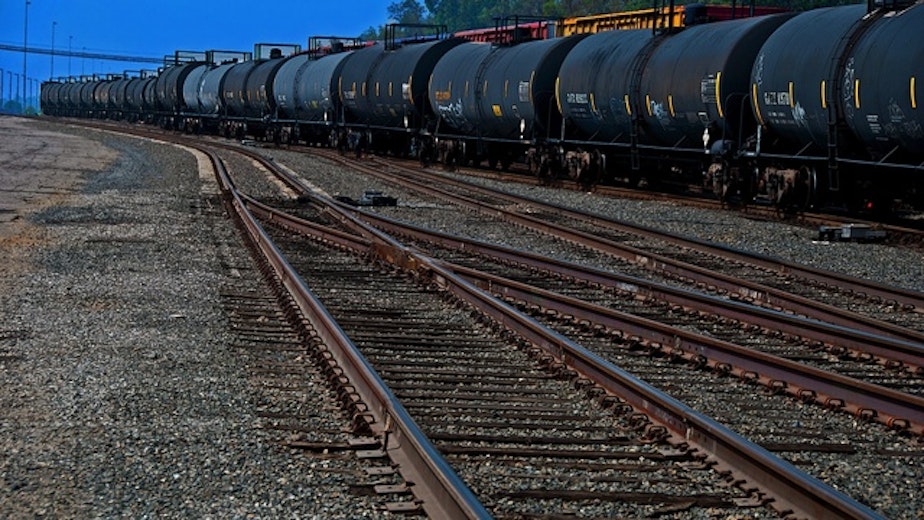Northwest States Tread Lightly With Oil Train Route Disclosures

The Northwest’s two main freight rail operators are complying with a federal requirement to inform states about the North Dakota crude oil they’re hauling, but they want the states to keep the public from finding out by signing non-disclosure agreements.Friday was the deadline under a federal Department of Transportation emergency order for railroads to file notifications with states about estimated volumes of Bakken crude oil being transported, the route and the frequency of the anticipated weekly train traffic.
Union Pacific and BNSF Railway, the two largest railroads through the region, have asked states for non-disclosure agreements, under which the information would be shared with state officials and emergency responders, but not the general public.
Washington refused. The state says withholding the notifications would violate its public records laws and initially made plans to post the information online. Wisconsin, Montana, Illinois, North Dakota and Idaho have also declined non-disclosure agreements, The Associated Press reports.
Read more: EarthFix Waypoints Blog
Karina Shagren, spokeswoman for the Washington Military Department, says the state will no longer make the information available online and will require a public records request. After receiving requests, it will alert the railroads that a request has been made. The railroads will have 10 days to seek a court injunction to block the release of the information.
Sponsored
Washington’s position changed, Shagren said, after the federal DOT issued guidelines to states advising them to treat the information as confidential, providing it only on a need-to-know basis.
Oregon officials remain undecided about whether to release the information and sought an opinion from the state Attorney General’s Office.
Sue Otjen, coordinator of Oregon’s State Emergency Response Commission (which receives the notifications) said she expects to know more about whether the state will release the information later this week.
Idaho and Montana are primarily pass-through states for Bakken oil on its way to West Coast terminals and refineries.
Washington received notifications from BNSF Railway, Union Pacific, and the short lines, Tacoma Rail and Portland & Western. Of those:
Sponsored
- Union Pacific informed the state it doesn’t move enough Bakken crude through Washington to meet the reporting threshold.
- BNSF moves oil into and through Washington to refineries on the coast and down into Oregon, destined either for the Clatskanie terminal or California refineries. As the primary mover of Bakken oil throughout the country, its notification will most likely contain more routes than any other railroad in the Northwest.
- Tacoma Rail serves the Port of Tacoma, where U.S. Oil and Refining accepts shipments of oil by rail.
- Portland & Western does not operate in Washington, but does carry trains of crude oil along the Oregon side of the Columbia River.
In Oregon, at least, the debate over publicizing the oil train notifications is more a matter of principle and precedent, as they most likely won’t reveal much beyond what’s already known:
- Union Pacific’s notification to Oregon also states that the railroad doesn’t meet the reporting threshold. It moves crude from Canada and Utah through the state, neither of which oil type is covered by the federal mandate for notifications.
- The heaviest traffic of oil trains through Oregon is along the Columbia River toward a terminal in Clatskanie, where Portland & Western Railroad has already volunteered how much it moves (110 total trains in 2013, or a couple of trains per week).
- The notifications could shed some more light on is how much Bakken oil BNSF Railway moves through Central Oregon. The railroad moved 4,300 oil tanker cars through the state last year, according to the Oregon Department of Transportation.
Oregon doesn’t have the best track record with transparency when it comes to oil trains. The state Department of Transportation’s rail division previously fought the release of similar notification information after The Oregonian took a public records request to the state attorney general. The Oregon Department of Transportation’s rail division then said it would stop requiring railroads to report such information, despite it being required by state law. The agency’s director later reversed that position.
Notifications about how much oil is moving and where became a prominent issue for state and federal regulators and lawmakers near the start of the year, after several explosions involving trains carrying Bakken crude drew scrutiny toward the fact that rail shipments of crude oil are more loosely regulated than other modes of transportation.
Sponsored
Emergency responders across the country were caught flat-footed, often unaware shipments of flammable crude were moving through their regions until they arrived and unable to get consistent information about when they’d be passing through or how often.
Regardless of what happens with non-disclosure agreements and the railroads’ attempts to keep the information from public view, the new notifications will reach emergency responders (though knowing what’s coming doesn’t mean they’re prepared for it). But knowing responders have that information won’t do much to satisfy members of the public who feel they have a right to know about oil trains moving through their communities, and that railroads are unnecessarily keeping secrets.
